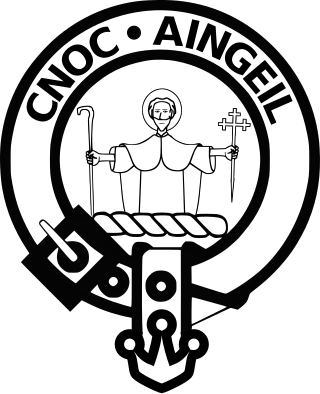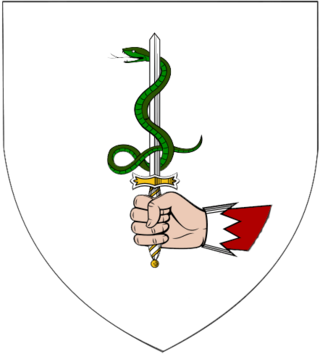
The Kingdom of Desmond was a historic kingdom in southwestern Ireland. It was founded in 1118 by Tadhg Mac Cárthaigh, King of Munster when the Treaty of Glanmire formally divided the Kingdom of Munster into Desmond and Thomond. It comprised all of what is now County Cork and most of County Kerry. Desmond was ruled by the Mac Cárthaigh (MacCarthy) dynasty. Other clans within the kingdom included the O'Sullivans and O'Donovans. Following the Norman invasion of Ireland in the late 12th century, the eastern half of Desmond was conquered by the Anglo-Normans and became the Earldom of Desmond, ruled by the Fitzmaurices and FitzGeralds—the famous Irish family known as the Geraldines. The king of Desmond, Diarmaid Mac Cárthaigh submitted to Henry II of England, but the western half of Desmond lived on as a semi-independent Gaelic kingdom. It was often at war with the Anglo-Normans. Fínghin Mac Carthaigh's victory over the Anglo-Normans at the Battle of Callann (1261) helped preserve Desmond's independence. The kings of Desmond founded sites such as Blarney Castle, Ballycarbery Castle, Muckross Abbey and Kilcrea Friary. Following the Nine Years' War of the 1590s, Desmond became part of the Kingdom of Ireland.
Diarmait Mac Murchada, was King of Leinster in Ireland from 1127 to 1171. In 1167, he was deposed by the High King of Ireland, Ruaidrí Ua Conchobair. To recover his kingdom, Mac Murchada solicited help from King Henry II of England. His issue unresolved, he gained the military support of the Richard de Clare, 2nd Earl of Pembroke, thus initiating the Anglo-Norman invasion of Ireland.
McMahon, also spelt MacMahon, were different Middle Age era Irish clans. Their name is derived from the Gaelic MacMathghamhna meaning 'son of the bear'.
Geoffrey Keating was an Irish historian. He was born in County Tipperary, Ireland, and is buried in Tubrid Graveyard in the parish of Ballylooby-Duhill. He became a Catholic priest and a poet.

The Clan MacLea is a Highland Scottish clan, which was traditionally located in the district of Lorn in Argyll, Scotland, and is seated on the Isle of Lismore. There is a tradition of some MacLeas Anglicising their names to Livingstone, thus the Clan Livingstone Society's website also refers to the clan as the Highland Livingstones. The current chief of Clan MacLea was recognised by Lord Lyon as the "Coarb of Saint Moluag" and the "Hereditable Keeper of the Great Staff of Saint Moluag."
The family name Whelan is an anglicisation of the Irish surname Ó Faoláin. The surname originates from the Middle Irish Úa Faeláin the name of the 10th to 11th century ruling dynasty of the Déisi, a population group inhabiting the area of the modern county of Waterford and County Kilkenny in the early medieval period.
The Uí Ceinselaig, from the Old Irish "grandsons of Cennsalach", are an Irish dynasty of Leinster who trace their descent from Énnae Cennsalach, a supposed contemporary of Niall of the Nine Hostages. Énda was said to be a grandson of Bressal Bélach and a first cousin of Dúnlaing mac Énda Niada, eponymous ancestor of the rival Uí Dúnlainge.

The O'Donovans are an Irish family. Their patronymic surname derives from Irish Ó Donnabháin, meaning the grandsons or descendants of Donnubán, referring to the 10th century ruler of the Uí Fidgenti, Donnubán mac Cathail. During the 12th and 13th century, O'Donovan relations relocated from the Bruree/Croom area south to the Kingdom of Desmond and to Carbery, where they were a ruling family for centuries and played a role in the establishment of a feudal society under the MacCarthys. Other septs retreated into the southeast corner of the Ui Fidgheinte territory, reaching from Broadford/Feenagh to the Doneraile area. The northern septs of the O'Donovans did not use a White Rod as the family's position in their original territory was vastly eroded, while several septs of O'Donovans in the southwest territories were semi-autonomous flatha under the MacCarthy Reagh dynasty in Carbery, with the most notable being local petty kings. The family were counted among the leading Gaelic nobility of Ireland.

McGowan is an Irish and Scottish surname. It is an Anglicization of the Irish Mac Gabhann and Scottish Mac Gobhann, both of which mean 'son of (the) smith'. Belonging to the Uí Echach Cobo, located in modern-day western County Down, Ulster, they were of the same stock as the McGuinness clan.

Caomhánach is an Irish-language surname first assumed by Domhnall Caomhánach, eldest son of the 12th-century Diarmait Mac Murchada, king of Leinster. A considerable number of anglicised variations of Caomhánach exist; some of the most common are Kavanagh, Cavanagh, Kavanaugh and Cavanaugh.

O'Dwyer, also known as Dwyer,Dyer is one of Ireland's oldest Gaelic noble or aristocratic houses, based most prominently in what is today County Tipperary. The name means "dark coloured", in reference to their progenitor Dubhuir mac Spealáin's hair colour.
Morrow is an anglicized surname of Irish or Scottish origins.
The Corcu Loígde, meaning Gens of the Calf Goddess, also called the Síl Lugdach meic Itha, were a kingdom centred in West County Cork who descended from the proto-historical rulers of Munster, the Dáirine, of whom they were the central royal sept. They took their name from Lugaid Loígde "Lugaid of the Calf Goddess", a King of Tara and High King of Ireland, son of the great Dáire Doimthech. A descendant of Lugaid Loígde, and their most famous ancestor, is the legendary Lugaid Mac Con, who is listed in the Old Irish Baile Chuinn Chétchathaig. Closest kin to the Corcu Loígde were the Dál Fiatach princes of the Ulaid.

The MacCarthy Reagh dynasty are a branch of the MacCarthy dynasty, Kings of Desmond, deriving from the Eóganacht Chaisil sept.
Donal IV O'Donovan,, The O'Donovan, of Clancahill, was the son of Donal III O'Donovan, The O'Donovan of Clancahill, and Gyles (Sheela) O'Shaughnessy, daughter of Elis Lynch and Sir Roger Gilla Duff O'Shaughnessy, The O'Shaughnessy.
MacLeòid or MhicLeòid is a masculine surname in Scottish Gaelic. The name translates into English as "son of Leòd". The feminine form of MhicLeòid is NicLeòid, which translates into English as "daughter of Leòd". These surnames originated as a patronyms. However, they no longer refer to the actual name of the bearer's father. There are numerous Anglicised forms of MacLeòid.

Carbery, or the Barony of Carbery, was once the largest barony in Ireland, and essentially a small, semi-independent kingdom on the southwestern coast of Munster, in what is now County Cork, from its founding in the 1230s by Donal Gott MacCarthy to its gradual decline in the late 16th and early 17th centuries. His descendants, the MacCarthy Reagh dynasty, were its ruling family. The kingdom officially ended in 1606 when Donal of the Pipes, 17th Prince of Carbery chose to surrender his territories to the Crown of England; but his descendants maintained their position in Carbery until the Cromwellian confiscations, following their participation in the Irish Rebellion of 1641 after which some emigrated to the Chesapeake Colonies.

Tully is a surname of Irish and Scottish origin, and spelling variations include; Tally, Talley, Tilly, MacTully, MacTilly, MacAtilla, O'Multilly, O'Multully, MacCantully, and Flood. These names are anglicisations of the following Irish names; Ó Taithligh, Ó Maoltuile, Mac Maoltuile, Mac Taichligh, and Mac an Tuile. Mac an Tuile is a corruption of Mac Maoltuile, and has also been anglicised as Flood due to "tuile" in Irish meaning "flood".
McMurphy, and its variants MacMurphy, Murphy and Murchison are anglicisations of the Irish language surname Mac Murchaidh. Mac Murchaidh has also been anglicised as McMurchy and MacMurchy. The clan originated in the ferns County Wexford such as Diarmaid mac Murchadha in the 17th century the clan was found in County Armagh. There are different origins than the Wexford, Cork and Fermanagh County septs.
The Murchison family of Loch Alsh, Ross-shire, Scotland were a minor Scottish clan, and a sept of the larger Clan Mackenzie. In modern times the Murchison surname is still considered a sept of the Clan Mackenzie by the Clan Mackenzie Society of Scotland & the UK.








